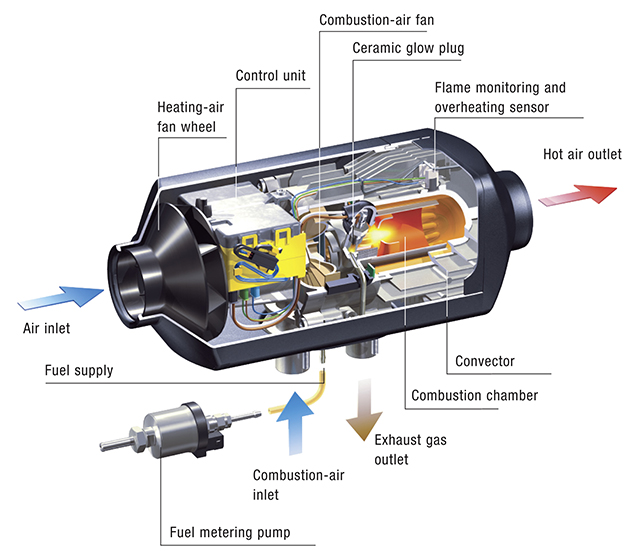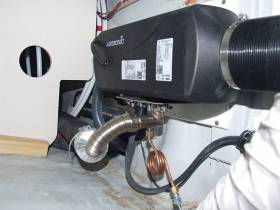Displaying items by tag: Eberspächer
Marine Heating Systems – Buyer Beware!
A generic guide to the important differences between marine and vehicle heater systems.
At this decidedly chilly time of year, the regular use and expected performance of your boat’s marine heating system will no doubt be at the forefront of your mind.
If you’ve installed a new system recently – or are thinking of doing so in the near future – it’s come to our attention that some well intended owners are nonetheless obtaining kits from various sources that may not have been designed specifically for boats.
The popularity of the internet as a source of information and marine discussion forums and blogs in particular, has meant that, despite some genuinely useful heater related information out there, there’s a fair bit of misunderstanding doing the rounds at the moment.
The main culprits are vehicle kits that, on the face of it look similar to their marine counterparts, but are cheaper than equivalent marine systems for good reason. This fact, in addition to the supply of parts and accessories that are not pattern made with requisite warranty to guarantee safety and reliability. Prompted us to put together a few questions & answers together to dispel the myths and put boat owners back on track to installing safer, ‘marine appropriate’ heating systems for their boats.
Based in Cork, Roger Betts from Union Chandlery concurred with us when he said: “As authorised service agents of Eberspächer we are well aware there are instances where automotive heaters are being fitted to boats across Ireland. This is being done at serious risk to both family and crew alike and if anyone is in any doubt they should contact us for their nearest service agent on 021 4554334.”
So with information supplied by Peter Collard, Engineering Manager, Marine Heating Systems, Eberspächer UK Ltd, we’re pleased to offer this largely generic guide to the important differences between marine and vehicle heater systems, and why only a marine grade heater system should be fitted to your boat or yacht.
 Airtronic heater internal - shows the internal operation of a diesel fired heater, itself quite an interesting diagram
Airtronic heater internal - shows the internal operation of a diesel fired heater, itself quite an interesting diagram
What’s the difference between a marine kit and a vehicle kit?
There’s an old adage for boat owners - “If it has ‘marine’ in the title it’s twice the price!” - but there’s always good reason for this and at Eberspächer, when designing marine kits, we remember that in a boat if anything goes wrong you can’t just get out and walk home!
We’re often asked - why shouldn’t I buy a cheaper vehicle kit and fit it to my boat? It’s a fair question, the universal heaters are identical, so why shouldn’t you?
The answer is there are many differences between a boat and a car kit. We not only ensure all our marine kits conform to the latest regulations and standards, but they are designed to be sea safe and more durable. We include extra-long double lagged exhaust systems, exhaust standoff safety brackets, fire retardant fuel systems, fuel close off valves etc. Our kits will endure the harsh environment found at sea with heavy duty stainless steel brackets and fittings.
There are more differences between a vehicle kit and a marine kit than most people realise. Herewith a quick comparison list summary of those important differences to be aware of:
Vehicle Kit Marine Kit
Nylon smooth fuel lines Metal beaded fuel line conforming to ISO 10088,7840 & BSS
Zinc plated fuel hose clips Stainless steel fuel hose clips conforming to ISO 10088
Standard Rubber fuel line joiners Fire retardant joiners also to ISO 10088
Un-lagged exhaust (typical 500mm) Double-lagged typical 2m exhaust
Single stainless exhaust clamp 2x stainless steel exhaust clamps
No exhaust stand-off brackets Stainless steel exhaust stand-off brackets
No exhaust skin fitting Stainless twin-wall skin fitting
Unsealed exhaust silencers In-line gas tight flexible exhaust silencer
Generally no combustion air silencer Combustion air silencer sea marine kits
No heater bracket Stainless steel heater bracket
Shorter looms (possible no external sensor) Longer looms with external sensor
Zinc plated screws Stainless steel screws
No duct or duct fittings Ducting, outlets, branches & fittings
Vehicle installation manual Marine installation manual
What are the pitfalls of buying systems from the internet?
Purchasing new or second hand heaters or parts from the internet can be fraught with problems and danger! If you are buying a new heater you should ensure it is a genuine UK supplied heater.
In our case, if the heater is new and supplied by Eberspacher UK Ltd then it will come with a full 3 year parts and labour warranty which includes travel. The UK warranty is uplift from the standard manufacturer’s 2 year warranty to provide even more peace of mind, including travel to and from your boat. When a marine kit is supplied from our factory in the UK there is a comprehensive record of dispatch, sale and installation which allows future reference to be made to enable the repair to be completed in the quickest possible time and without recourse to the customer making any payment.
Secondly, do your homework! Many new and second hand heaters sold on the internet today are designated as original equipment manufacturers (OEM) heaters. This means they were designed and destined for OEM vehicles or, if second hand, have previously been fitted to a vehicle as a standard factory option.
The OEM heater is generally designed specifically for the vehicle it is fitted to. It will normally look identical to the universal version but may differ in many ways, different wiring, different switching protocol, different internal parts etc. Neither Eberspächer UK nor their dealers hold stock of OEM parts or detailed information on OEM heaters. The contract is between the OEM vehicle builder and Eberspächer GmbH & Co. This is no different to an OEM starter motor, alternator etc. The truck or vehicle manufacturer wants you to return the part to them and not a third party. So, for example, if you buy a Mercedes heater, you will have to take it back to Mercedes or buy parts from Mercedes should something go wrong. Eberspächer GmbH & Co manufactures many different variations of the same heater. One or two of these models are designed as a “universal” heater and these are the heaters used for retrospective fitting to trucks, ambulances, camper vans, boats etc. and these are the ones you should be buying.
Many vehicles have what are referred to as ‘add heaters’. These are water heaters designed to start and “add heat” when the engine is running and the coolant is below a certain temperature. These water heaters are always OEM heaters; they utilize the engines water pump and generally have the designation D3Z, D5Z. These heaters are not supported by Eberspächer UK or any of our dealers.
Before you buy a second hand heater with the idea of fitting it into your boat, we strongly recommend you price all the ancillary items first.
Normally by the time you have bought a lagged exhaust system, metal fuel system, close off valves, ducting, branches, outlets, combustion air silencer, looms, heater bracket, controller, stainless clips and clamps etc. it would normally be far cheaper to buy a brand new full kit with three years parts labour and travel cover. If you are buying parts only, once again we urge you to be extremely careful. The part must be right for the heater and the job!
A vehicle exhaust silencer can seem a very attractive bargain but they are not gas tight or lagged. Having an exhaust leak inside a boat is definitely not worth the risk. A vehicle exhaust is designed to be fitted under a vehicle and that’s all! A marine silencer is an integral part of the exhaust; it is totally gas tight, lagged and flexible.
Fuel pumps are finely calibrated to the specific size of heater they were designed for. If you buy a pump calibrated for a larger heater, it can lead to serious overheating or coking issues.
Cheap exhaust clamps sometimes fail to compress the exhaust or heavy gauge stainless exhaust fittings. This can easily leave the exhaust in a loose and dangerous condition etc.
Basically, genuine heater parts are not just made to work; they are made to cope should something ever go wrong. Genuine parts will deal with overheat situations, harsh or extreme conditions, excessively high or low temperatures, vibration and shock. Cheap parts from internet auction sites don’t always meet the same criteria, so buyer beware!
Eberspächer manufacture two different heater ‘systems’ for boats, both use combustion air and diesel fuel mixed and ignited within the heater’s internal combustion chamber to create thermal energy.
The Airtronic range lends itself to more instant heat requirements by drawing in fresh or recirculated air which is heated and distributed to cabins & rooms via ducts and air outlets. For larger boats, the Hydronic range uses a heat exchanger to transfer its thermal energy to the boat’s own internal water system and provides a more consistent heat output akin to a domestic radiator/ convector based system.
The importance of not only buying the correct system in the first place, but in having it installed safely and working correctly and avoiding common errors of DIY installation such as an uneven distribution of heat, is a decision likely to save you money in the long run.
























































